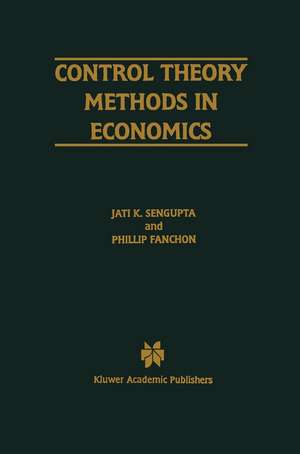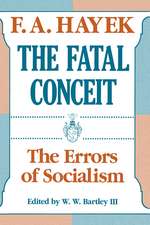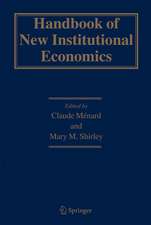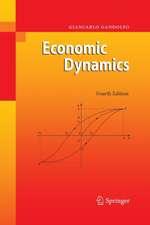Control Theory Methods in Economics
Autor Jati Sengupta, Phillip Fanchonen Limba Engleză Hardback – 31 ian 1997
| Toate formatele și edițiile | Preț | Express |
|---|---|---|
| Paperback (1) | 943.43 lei 6-8 săpt. | |
| Springer Us – 10 oct 2012 | 943.43 lei 6-8 săpt. | |
| Hardback (1) | 949.42 lei 6-8 săpt. | |
| Springer Us – 31 ian 1997 | 949.42 lei 6-8 săpt. |
Preț: 949.42 lei
Preț vechi: 1157.82 lei
-18% Nou
Puncte Express: 1424
Preț estimativ în valută:
181.69€ • 188.61$ • 151.50£
181.69€ • 188.61$ • 151.50£
Carte tipărită la comandă
Livrare economică 22 martie-05 aprilie
Preluare comenzi: 021 569.72.76
Specificații
ISBN-13: 9780792398455
ISBN-10: 0792398459
Pagini: 258
Ilustrații: IX, 258 p.
Dimensiuni: 155 x 235 x 16 mm
Greutate: 0.56 kg
Ediția:1997
Editura: Springer Us
Colecția Springer
Locul publicării:New York, NY, United States
ISBN-10: 0792398459
Pagini: 258
Ilustrații: IX, 258 p.
Dimensiuni: 155 x 235 x 16 mm
Greutate: 0.56 kg
Ediția:1997
Editura: Springer Us
Colecția Springer
Locul publicării:New York, NY, United States
Public țintă
ResearchCuprins
1 Introduction to Control Theory.- 1.1 Transition from the calculus of variations to optimal control.- 1.2 Transition from theory to practice.- References.- 2 Continuous Time Models.- 2.0 Overview of control problems.- 2.1 Observability and controllability.- 2.2 Stability analysis.- 2.3 The maximum principle.- 2.4 Constraints.- 2.5 Example 1; A limit pricing model..- 2.6 Example 2; reaching a steady state cycle.- References.- 3 Discrete Time Models.- 3.0 Introduction.- 3.1 General deterministic and discrete control problems.- 3.2 The linear quadratic problem.- 3.3 Analytic solution of the Riccati equation.- 3.4 Equivalent dynamic equations.- 3.5 Discrete control of nonlinear systems.- 3.6 Observability and observers.- 3.7 Economic examples.- References.- 4 Stochastic Control Theory.- 4.0 Introduction.- 4.1 Stochastic processes under control.- 4.2. Economic applications.- 4.3 Kalman filtering methods.- 4.4 Concluding remarks.- References.- 5 Economic Implications of Stochastic Control.- 5.0 Introduction.- 5.1 Time inconsistency problems.- 5.2 Short-run vs. long-run optimality.- 5.3 Model of adjustment costs with rational expectations.- 5.4 An application to new growth theory: dynamic adjustments with learning by doing.- 5.5 Concluding remarks..- References.- 6 Variable Structure Systems.- 6.0 Introduction.- 6.1 The variable structure control formulation.- 6.2 A VSC approximation of an optimal control law.- 6.3 Example; The expectations-augmented Phillips relation.- 6.4 Concluding remarks.- References.- 7 Risk Sensitivity, Adjustment of Control and Estimation.- 7.0 Introduction.- 7.1 Learning process in differential games.- 7.2 Adjustment costs in portfolio models.- 7.3 Econometric estimation of controlled systems.- 7.4 Estimating transversality conditions.- 7.5 Concluding remarks.- References.












